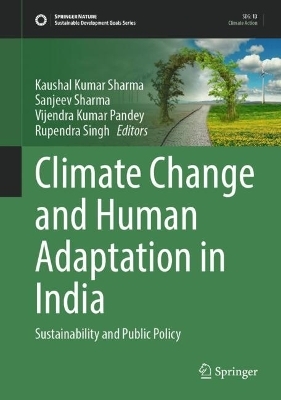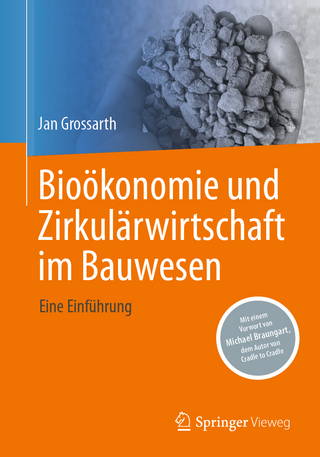
Climate Change and Human Adaptation in India
Springer International Publishing (Verlag)
978-3-031-55820-7 (ISBN)
This contributed volume presents an attempt to understand climatic variability and induced risk to livelihood of communities and to offer insights on how catastrophic conditions and crises can be mitigated through public policy interventions. The case studies herein offer insights into different spheres and domains affected by climate change and present models of adaptation possibilities. The book is divided into three thematic sections. The first contains chapters that deal with assessing the effects of climate change. The second section offers perspectives on adaptation and governance, vulnerability in the context of sustainable livelihoods. The third and last section looks at Policy and Governance, with respect to climatic change adaptation and mitigations. The lessons contained in this volume are useful to a wide audience including research scholars, students, policymakers, and planners.
Dr. Kaushal Kumar Sharma is a Professor of Geography in the Centre for the Study of Regional Development and the Dean of the School of Social Sciences at Jawaharlal Nehru University, New Delhi. His areas of specialization include regional development planning, water resources management, disaster risk reduction, landslides, and applied physical geography. Previously, he served as an Associate Professor in the Department of Geography at Kirori Mal College, University of Delhi, Delhi. With over four decades of teaching experience at the undergraduate, postgraduate, and research levels, he has led numerous research projects funded by the Department of Science and Technology, Ministry of Science and Technology, Government of India; Planning Commission; University Grant Commission; and THDC-SEVA.
His primary research focuses on landslide hazard and risk assessment, the impact of climate change on communities, water resource management, and rural development. Dr. Sharma has successfully implemented several action-based research projects for rural transformation in the Himalayas, funded by SEVA-THDC. This project stands as an exemplary effort by an academician to improve the lives of communities residing in remote areas. He has authored numerous books, research papers in leading journals, and book chapters.
Dr. Sanjeev Sharma
Dr. Sanjeev Sharma is presently working as Associate Professor in the Centre for Study of Regional Development, School of Social Science, Jawaharlal Nehru University New Delhi -India, since 2017. Over the past one and half decades he has worked in different academic and research institute in India viz. Dr. Ambedkar International Centre, MoSJE, Govt. of India, Dr. H.S. Gour Central University of Sagar (M.P.), IISER, Mohali, WWF-India and G. B. Pant National Institute of Himalayan Environment (NIHE). He has been worked in the higher altitude region of western Himalaya on various society-nature and environmental issues. He has developed many conservations model for resource management and sustainability for natural resource conservation and socio-economic transformation in the western Himalaya. His work is extensively focused on field based applied research with local community to know the grassroot level issues and develop model other related stakeholders. He has more than 50 International and National research publications to his credit in Journals, Book Chapters, Proceedings and Popular articles etc. He has completed and presently working on Research Project funding from ICSSR, ONGC, THDC and Deptt. of Wildlife Protection, Jammu & Kashmir etc.
Dr. Vijendra Kumar Pandey is currently serving as an Assistant Professor in the Department of Geography at Kirori Mal College, University of Delhi, Delhi. He holds a Master's and Ph.D. in Geography from the Centre for the Study of Regional Development, Jawaharlal Nehru University, New Delhi. His areas of specialization encompass geomorphology, landslide modeling, geo-chronology, climatic variability and adaptations, natural hazards, remote sensing, and physical geography. Dr. Pandey is actively involved in a research project focused on climate change adaptations in the Central Himalayan region, exploring indigenous approaches to climatic resilience. He has authored more than 15 research papers in leading journals and contributed 9 chapters to edited books, covering topics such as landslide susceptibility and risk assessment, climate change adaptations, and governance.
Dr. Rupendra Singh is working at School of Social Sciences, Jawaharlal Nehru University, New Delhi. He has completed his Master from Department of Geography, University of Allahabad, Prayagraj, U.P. and Ph. D. in Environmental Science from the Department of Environmental Science, School of Basic Sciences and Research, Sharda Univers
Chapter 1: Glaciological study and Climate change in Indian Perspective.- Chapter 2: Climate change impact on hydrogeochemical characteristics of Himalayan glacier meltwater.- Chapter 3: Impact of Changing Climate on the Cryospheric Region and Glacier Retreat in the Himalayan Region.- Chapter 4: Indian Himalayan Glaciers' Health under Changing Climate.- Chapter 5: Role of Aerosols in Atmospheric Dynamics and Deciphering the Climate Change.- Chapter 6: Examining Rainfall Trends in Guntur District, Andhra Pradesh, India, Amidst the Climate Change Challenge.- Chapter 7: Climate-Induced Vulnerability, Adaptation and Mitigation Strategies.- Chapter 8: Climate Change and Nature-Based Solutions.- Chapter 9: Human Vulnerability in Changing Environment of Active Delta region of India.- Chapter 10: Understanding livelihood diversification as a sustainable adaptive strategy to existing challenges in the higher Himalayan villages.- Chapter 11: Sustainability through Sacred Groves.- Chapter 12:The Climate Refugees of Bundelkhand: A study on issues and challenges to sustainable livelihoods in Bundelkhand.- Chapter 13: Emerging Need to Sustain and Preserve the Traditional Knowledge of Indigenous communities to Combat Climate Change. Chapter 14: Climate Change Adaptation Policies and Governance. Chapter 15: Adaptation Policy and Governance Toward Tribal Communities of Southern Rajasthan, India.- Chapter 16: Climate Change and its Effects on Major Crops Production in Assam, India.- Chapter 17: Hailstorm and Loss Assessment.- Chapter 18: Responses to Climate Change in Global North and South.
| Erscheinungsdatum | 01.06.2024 |
|---|---|
| Reihe/Serie | Sustainable Development Goals Series |
| Zusatzinfo | XV, 276 p. 37 illus., 36 illus. in color. |
| Verlagsort | Cham |
| Sprache | englisch |
| Maße | 178 x 254 mm |
| Themenwelt | Naturwissenschaften ► Biologie ► Ökologie / Naturschutz |
| Naturwissenschaften ► Geowissenschaften | |
| Sozialwissenschaften ► Politik / Verwaltung ► Staat / Verwaltung | |
| Schlagworte | Adaptation • climate change • Extreme events • Indian Himalaya • Natural Hazards • Sustainable livelihoods • vulnerability |
| ISBN-10 | 3-031-55820-0 / 3031558200 |
| ISBN-13 | 978-3-031-55820-7 / 9783031558207 |
| Zustand | Neuware |
| Haben Sie eine Frage zum Produkt? |
aus dem Bereich


